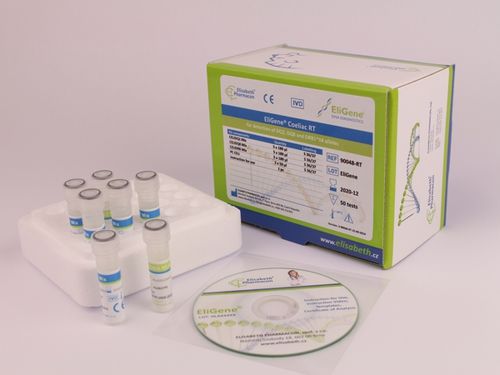
- Laboratory
- Laboratory medicine
- Celiac disease test kit
- Elisabeth Pharmacon spol
Celiac disease test kit EliGene® Coeliacrheumatoid factorfor genesblood
Add to favorites
Compare this product
Characteristics
- Applications
- celiac disease
- Tested parameter
- rheumatoid factor, for genes
- Sample type
- blood, urine, for DNA
- Analysis mode
- for PCR
Description
This diagnostic kits are based on RealTime PCR method. In this kits primers and labeled probes (FAM and JOE) for the detection of alleles and for the detection of internal control are used.
Compatible instruments
The following list represents instruments on which the above mentioned kits were tested. Please contact us for compatibility with other instruments.
Roche: LightCycler® 480, LightCycler® Nano
Thermofisher Scientific: Quant Studio 3 a 5
Applied Biosystems: ABI 7000, 7300, 7500FAST
General information
Coeliac disease, also called celiac sprue is one of the most common enteropathogenic disorders and is characterized by a lifelong hypersensitivity to gluten proteins found in wheat, rye, oat and barley. Celiac disease does not belong to allergic disease but it is characterized by intolerance to gliadin forming parts of gluten. In early childhood the immunological intolerance to gliadin, leads to a chronic inflammatory response in the small-intestinal mucosa and subsequent malabsorption characterized by chronic diarrhea, steatorrhea and failure to thrive. Many adult patients can also show other atypical signs such as, abdominal distention, weight loss, fatigue, skin- and joint problems or migraine-like headache. Indeed, others may remain largely asymptomatic. Non-treated celiac disease increases the risk of NHL (non-Hodgkin's lymphoma) and probably small-intestinal cancer.
Until recently, coeliac disease was considered relatively uncommon with an estimated prevalence rate ranging from 1 in 1000 to 1:4000. However, the availability of new serologic tests have led to the observation that coeliac disease is much more common,
Catalogs
Other Elisabeth Pharmacon spol products
EliGene Human Genetics
Related Searches
- Assay kit
- Solution reagent kit
- Blood assay kit
- Molecular biology reagent kit
- Serum assay kit
- Plasma assay kit
- Infectious disease detection kit
- Diagnostic reagent kit
- Laboratory reagent kit
- Enzyme reagent kit
- Molecular test kit
- Respiratory infection test kit
- Histology reagent kit
- Clinical assay kit
- Dye reagent
- COVID-19 assay kit
- Real-time PCR test kit
- Research assay kit
- Antigen assay kit
- Virus reagent kit
*Prices are pre-tax. They exclude delivery charges and customs duties and do not include additional charges for installation or activation options. Prices are indicative only and may vary by country, with changes to the cost of raw materials and exchange rates.





